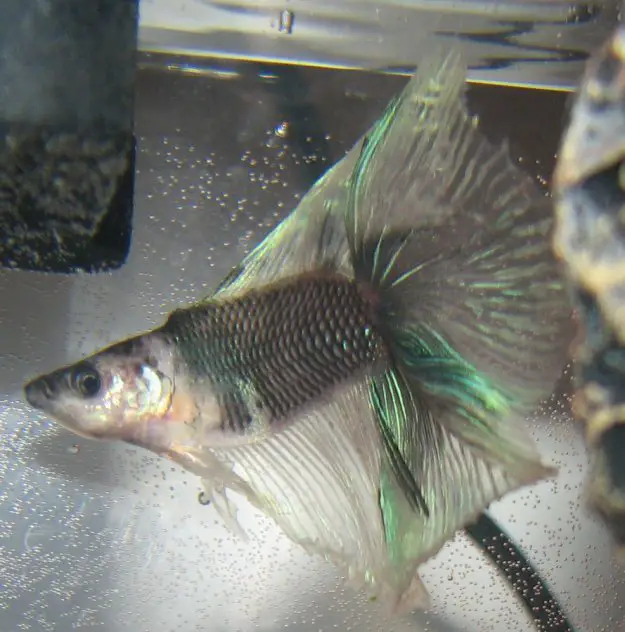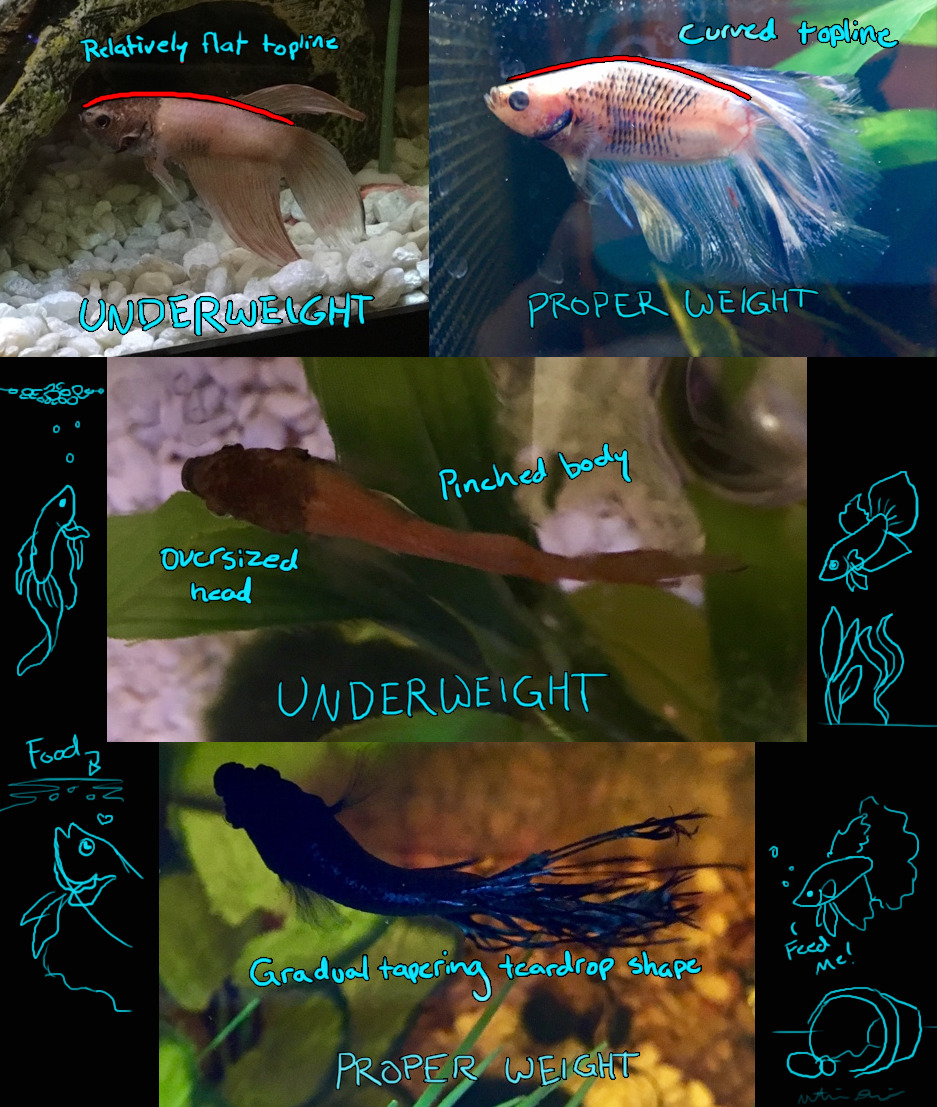Originally posted on May 5, 2023 @ 5:25 pm
Last Updated on 9 months by admin
If you’re a Betta fish lover, you may have noticed that some of these vibrant creatures are skinnier than others. While it’s normal for Betta fish to have varying body shapes and sizes, it’s essential to ensure that your fish is healthy and well-fed. In this article, we’ll explore the reasons why your Betta fish might be skinny and provide you with practical tips to help your fish regain its health and vitality.
A skinny Betta fish could be due to several reasons, including poor nutrition, improper tank conditions, or underlying health issues. As a responsible pet owner, it’s crucial to identify the root cause of your fish’s skinny appearance and take proactive steps to address the issue. By following our expert advice, you’ll be able to provide your Betta with the care it needs to thrive and live a long, happy life.
Skinny Betta fish can be a sign of a variety of issues, such as poor diet or illness. To help your Betta regain weight, start by feeding them a balanced and varied diet. You can also try adding supplements like frozen or live foods, as well as adding aquarium salt to their water. Make sure to keep their tank clean and at a consistent temperature. If your Betta’s weight loss continues, consult with a veterinarian who specializes in fish care.

Dealing with Skinny Betta Fish
Betta fish are among the most popular aquarium fish in the world. These colorful and active fish are known for their lively personalities, but sometimes they might lose weight or appear skinny. In this article, we will discuss the possible reasons behind the skinny appearance of betta fish and how to deal with it.
Understanding the Causes of Skinny Betta Fish
There are several reasons why your betta fish might appear skinny. Here are some of the most common causes:
- Poor Nutrition: Betta fish require a balanced diet to maintain their health. If their diet lacks essential nutrients, they may lose weight.
- Disease: Some diseases can cause betta fish to lose weight, such as bacterial infections, parasites, or tumors.
- Stress: Stress can also cause betta fish to lose weight. Factors such as overcrowding, poor water quality, or sudden changes in water temperature can all cause stress in betta fish.
It is important to identify the cause of your betta fish’s weight loss before taking any action.
How to Deal with Skinny Betta Fish
If you notice that your betta fish is skinny or losing weight, there are several steps you can take to help them:
- Feed a Balanced Diet: Make sure your betta fish is getting a balanced diet that includes high-quality pellets, frozen or live food, and occasional treats like bloodworms or brine shrimp.
- Improve Water Quality: Betta fish require clean water to stay healthy. Make sure to perform regular water changes and use a good quality filter to keep the water clean and clear.
- Reduce Stress: Avoid overcrowding the tank and make sure your betta fish has plenty of hiding spots or plants to reduce stress. Keep the water temperature stable and avoid sudden changes.
- Medicate if Necessary: If your betta fish has a disease or parasite, it may require medication. Consult with a veterinarian or an experienced fish hobbyist to determine the best course of action.
The Benefits of a Healthy Betta Fish
Keeping your betta fish healthy and happy has many benefits. A healthy betta fish will have vibrant colors, a lively personality, and a longer lifespan. They will also be less susceptible to diseases and infections.
Skinny Betta Fish vs. Healthy Betta Fish
There are several differences between skinny and healthy betta fish that you can observe:
| Skinny Betta Fish | Healthy Betta Fish | |
|---|---|---|
| Body Shape | Thin and bony | Plump and rounded |
| Color | Faded or dull | Bright and vibrant |
| Personality | Less energetic and active | Lively and playful |
By observing these differences, you can determine whether your betta fish is healthy or not.
Conclusion
In conclusion, keeping your betta fish healthy and happy requires a balanced diet, clean water, and a stress-free environment. If you notice your betta fish is losing weight or appears skinny, take action to identify and address the cause.
Frequently Asked Questions
Betta fish are beautiful creatures that are known for their vibrant colors and long, flowing fins. However, sometimes they can become skinny and weak, which can be a cause for concern. Here are some frequently asked questions about dealing with skinny betta fish:
Why is my betta fish so skinny?
There are many reasons why your betta fish may be skinny. It could be due to a poor diet, an illness, or stress. It’s important to identify the cause of your betta fish’s skinny appearance so that you can take the appropriate steps to address the issue.
If your betta fish is not eating or is eating very little, it may be due to an illness. Common illnesses that can cause a loss of appetite include swim bladder disease, dropsy, and fin rot. You may need to consult with a veterinarian who specializes in fish to get a proper diagnosis and treatment plan.
How can I help my skinny betta fish gain weight?
If your betta fish is skinny, it’s important to help them gain weight in a healthy way. One way to do this is to feed them a high-quality diet that is rich in protein and nutrients. Look for fish food that is specifically designed for betta fish and contains ingredients such as krill, shrimp, and fish meal.
It’s also important to make sure that your betta fish is living in a clean and stress-free environment. A dirty tank or stressful living conditions can cause your betta fish to lose weight and become unhealthy. Make sure to perform regular water changes and provide your betta fish with plenty of hiding places and plants to help them feel safe and secure.
Can I overfeed my skinny betta fish?
While it’s important to feed your skinny betta fish a healthy and nutritious diet, it’s also important to avoid overfeeding them. Overfeeding can lead to obesity and other health problems in betta fish. A good rule of thumb is to only feed your betta fish what they can eat in two to three minutes, twice a day.
If your betta fish is not eating, it’s important to avoid overfeeding them in an attempt to get them to eat. This can actually make the problem worse and lead to other health issues. Instead, try to identify the cause of their lack of appetite and address it accordingly.
What can I do to prevent my betta fish from becoming skinny?
The best way to prevent your betta fish from becoming skinny is to provide them with a healthy and stress-free environment. This includes ensuring that their tank is clean and well-maintained, providing them with a proper diet, and avoiding overfeeding them. You should also make sure that your betta fish is not living in a tank that is too small or crowded.
It’s also important to monitor your betta fish for signs of illness or stress and to address any issues promptly. This can help prevent your betta fish from becoming skinny and unhealthy.
When should I be concerned about my skinny betta fish?
If your betta fish is skinny and you have ruled out common causes such as poor diet or stress, it’s important to consult with a veterinarian who specializes in fish. Your betta fish may be suffering from an underlying health condition that requires medical attention. Signs that your betta fish may be in distress include lethargy, loss of appetite, and abnormal behavior.
It’s always better to err on the side of caution when it comes to the health of your betta fish. If you are concerned about your skinny betta fish, don’t hesitate to seek professional advice.

Betta Fish Who Wouldn’t Eat Or Swim Is Completely Transformed | The Dodo Faith = Restored
In conclusion, dealing with skinny betta fish can be a challenge, but it is a problem that can be solved with the right approach. By identifying the underlying cause of the fish’s thinness, adjusting its diet and environment, and providing proper care and attention, you can help your betta regain its health and vitality.
Remember that prevention is always better than cure, so it is important to maintain a healthy and balanced diet for your betta and keep its tank clean and well-maintained. Regular check-ups and observation can also help you catch any health issues early on and prevent them from becoming a bigger problem.
Ultimately, taking care of a betta fish is a rewarding experience that requires patience, dedication, and a willingness to learn. With the right knowledge and approach, you can enjoy the beauty and companionship of your betta for years to come.
